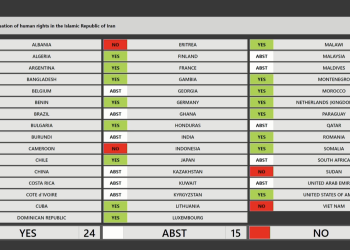UN Special Rapporteur mandate renewed with calls to continue investigating abuses in the Islamic Republic of Iran
Persian translation here
The United Nations Human Rights Council voted today to renew the mandate of the UN Special Rapporteur on the human rights situation in Iran.
The resolution passed by 24 votes, with 15 abstentions and 8 votes against, and also called for the extension of the human rights fact-finding mission established in November 2022.
Speaking ahead of the vote, the United States said that “members of religious and ethnic minority groups, including … Baha’is, have been denied their right to exercise their freedom of religion or belief, and in recent weeks, have been subjected to the desecration of holy sites including burial grounds.”
Brazil said it “remains troubled” by reports of violations of minorities. “We reiterate our support to the rights of Baha’is, and persons belonging to other religious minorities, to exercise their faith freely and peacefully in Iran without any discrimination,” they said.
The vote comes days after a major new report was published by Human Rights Watch, titled “The Boot on My Neck: Iranian Authorities’ Crime of Persecution Against Baha’is in Iran,” which said the Iranian government is committing the “crime against humanity of persecution” against the Baha’is.
Professor Javaid Rehman, the outgoing UN Special Rapporteur, had previously delivered a strongly-worded report to the Human Rights Council, on 18 March, in which he described the “extreme” and “persistent” persecution faced by members of the Baha’i religious minority in the Islamic Republic.
“I am extremely distressed and shocked at the continuing, persistent persecution, arbitrary arrests, and harassment of members of the Baha’i community,” he said. “I’ve warned the authorities to immediately stop these crimes … for which they will be held accountable.”
Professor Rehman’s full six-year term concludes this summer. The latest resolution means that a successor will now be appointed to continue this work from July 2024.
“We welcome the continued attention and support of the UN Human Rights Council for the human rights situation in Iran,” said Simin Fahandej, Representative of the Baha’i International Community to the United Nations in Geneva. “But it is deplorable that the Iranian government has obliged the international community to renew the mandate of the Special Rapporteur, yet again, rather than recognizing the rights of Baha’is and all others equally and enabling them to live full lives alongside their compatriots.”
Several UN member states—Belgium, Canada, Luxembourg, Moldova, the United Kingdom and Australia— had also previously called on the Iranian government to collaborate with UN human rights mechanisms and mentioned the persecution of Baha’is in the country.
“The least the Iranian government can now do is to allow the re-appointed UN human rights mechanisms to investigate the situation in Iran with access to the country, access to Baha’is and members of other minorities, meetings with human rights defenders, and to accept the recommendations on undoing years of brutal persecution against all of Iranian society,” Ms. Fahandej said.
